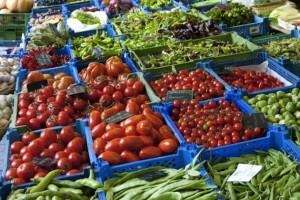Many people are familiar with the terms organic food and genetically modified food.
However, not everyone knows the leading difference between organic produce and genetically engineered (GE) foods. Senior Sarah Nofal said, “They increase the amount of pesticides in genetically modified foods. They also make the food bigger to satisfy more people. But, I don’t know much about it.”
 Organic foods are referred to the way the agricultural products are grown and processed. Organic crops must be grown in safe soil and cannot have any modifications. Farmers are not allowed to use synthetic pesticides, bioengineered genes (GMOs), petroleum-based fertilizers, and sewage sludge-based fertilizers.
Organic foods are referred to the way the agricultural products are grown and processed. Organic crops must be grown in safe soil and cannot have any modifications. Farmers are not allowed to use synthetic pesticides, bioengineered genes (GMOs), petroleum-based fertilizers, and sewage sludge-based fertilizers.
Organic livestock must have access to the outdoors and be given organic feed. They may not be given antibiotics, growth hormones, or any animal-by-products.
GMOs or GE foods are plants or animals whose DNA has been altered. These products have undergone only short-term testing to determine their effects on humans and the environment.
Likewise, conventionally grown produce is grown with synthetic and chemical fertilizers. Weeds are controlled with chemical herbicides, and insecticides are used to manage pests and disease.
Senior Evan McClain said, “I don’t really have a preference, I like food in general. But, I feel like they should label what is in GE foods.”
On the other hand, Nofal said, “I definitely believe that organic food is healthier, but not everyone can afford the cost of organic foods. However, I also think that in other parts of the world GE foods should be used because in America, people won’t go starving. We have enough resources, unlike other countries. They need to increase the amount of food [with GMOs].”
One huge concern from consumers is the safety of GMO and GE foods. According to Organic Valley, today, over 80 percent of US corn, soybeans, and cotton crops are genetically modified. In addition, 90 percent of consumers surveyed say they want identifying labels on GM foods, but the FDA does not require such foods to bear an identifying label.
Sophomore Amber Barnes said, “By producing the GE foods, it can be helpful to the economy because it produces foods in a faster rate. It can be dangerous too, the chemicals they are putting in, have they been tested? Because if they mess up on one, people can get diseases. You have the right to know what is in your in your food.”

